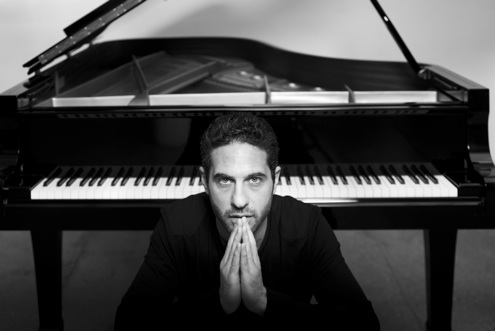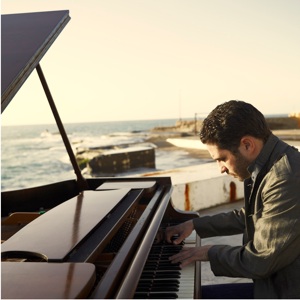For me, one of the highlights of 2012 was discovering the music of Walid Nahas, a Canadian composer/pianist who was born in Lebanon. Walid has released two albums so far: Immersion (2011), which is all solo piano, and En Harmonie (2012) which features him on both piano and harmonica. Walid masterfully combines classical and contemporary influences, merges them with Eastern and Western cultures, and infuses them with deep emotion. Walid’s music ranges from very soft and tender to bold, dramatic, and very intense. I find it very exciting to discover an artist of this calibre, and I want to introduce him to as many potential fans as possible. Here is our first interview, conducted via email in January 2013.
KP: Where did you do your recordings?
WN: The piano recordings are done in studio on a Yamaha grand piano without the use of any digital sound or effects. By using a “neck harmonica holder,” I am able to record the harmonica and the piano simultaneously. The studio recordings are very similar to a live performance except that I can record the same track many times until I am totally satisfied!
KP: Are you working on your next album now?
WN: Absolutely! I should hopefully be ready to start recording it this summer.
KP: Do you perform live often?
WN: Not as often as I would like to! I really enjoy live performances. Sharing my music with an audience is always a magical moment. Each live performance is such a powerful experience, and I wish I could do more of them.
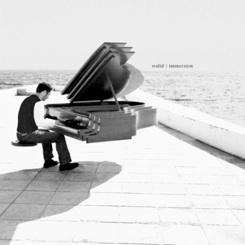
Click the album covers to read Kathy's reviews.
KP: I have no doubt that you will be doing many more live performances in the coming years. Even though it’s so far away, I’d love to have you play at my house whenever you feel like coming to the Oregon Coast!
On the cover of Immersion, it looks like the piano and bench are floating, and it looks like the piano has three lids and cases. How did you do that? It’s a great effect!
WN: It is my good friend and very talented photographer/visual artist VARIAL who did it. He wanted a picture that recreated the mood of my music, so he came up with this great idea! By using a software on his computer he was able to create this amazing effect. You can check out his work on his
website.
KP: His work is stunning! Did he do the photography for both albums?
WN: No, the photography was done by Joe Kesrouani a famous Lebanese photographer.
KP: Let’s chat a bit about your background. Where were you born and where did you grow up?
WN: I was born in Beirut, Lebanon in 1975, but because of the civil war we had to leave the country. My parents moved our family to France first, and then to Montreal, Canada. I grew up in three very distinct cultures: the Oriental culture, the European culture and finally the North American culture!
KP: Was that confusing to you as a child?
WN: Good question. As a child it wasn’t. But later on… The challenge was to try and take the best of each different culture.
KP: Are any of your family members musical?
WN: Yes, but not professional musicians. My father, grandmother and great grandmother were all good pianists. My Steinway piano was my great grandmother’s. It was her wedding gift from my great grandfather in 1925. Composing on this piano is such a great source of inspiration for me. This piano is full of emotions and history and it survived twenty years of civil war without a scratch!! I also used that piano on the cover of my album immersion.
KP: What an amazing story! How old were you when you were introduced to the piano?
WN: I was introduced to the piano at a very young age and started studying it at the age of 8.
KP: How long did you take piano lessons? Were the lessons your idea or your parents’ idea?
WN: It was my idea to learn the piano. My parents were kind and generous enough to bring me to a piano teacher. I will never thank them enough for doing so!!
KP: Were your lessons mostly classical or did you learn a variety of musical styles?
WN: My lessons were only classical from the ages of 8 to 18. After that I started learning jazz, pop and rock music on my own.
KP: Were you encouraged to improvise and/or compose by any of your teachers?
WN: Not at all! I had very strict teachers. I was forced to follow and stick to the musical sheets. I stopped studying classical music because I really wanted to compose my own music. I started improvising and composing on my own during my years as a piano bar player.
KP: When was that?
WN: I was in my early 20’s.
KP: Do you play any instruments besides the piano and harmonica?
WN: I really enjoy playing the guitar, but I am not very good at it ;)
KP: How old were you when you wrote your first song?
WN: Difficult to say. I started improvising at a very young age, but my first song? I was probably 12 years old.
KP: Are you able to make a living as a musician or do you have another career as well?
WN: Unfortunately not! I mostly make a living with my art paintings. I am a painter.
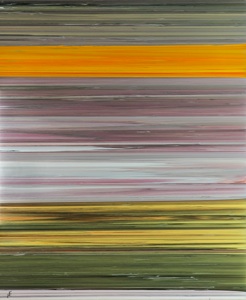
Horizontal Scale - In the Key of C minor - Enamel on canvas - 180cm x 220cm.
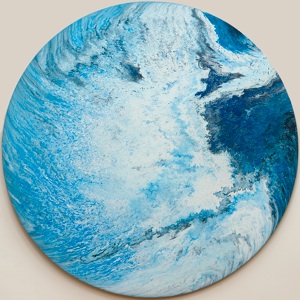
Rhapsody in Blue - Enamel on canvas - Diameter 120cm.
KP: Now, that’s a surprise! I used to do a lot of drawing, but there never seems to be enough time anymore. I hope to get back to it sometime! How many galleries display your work?
WN: I display exclusively with SMO Gallery. But I also work freelance with interior designers.
KP: Do you ever go back to your native country, Lebanon, to visit or perform?
WN: Yes, I try to travel as much as I can. Traveling is my passion and my great source of inspiration. I moved back to my native country a couple of years ago. I’ve decided to compose and record my next album in Lebanon this year.
KP: How do you think recording in Lebanon will affect your music?
WN: Too soon to say…but definitely more Oriental influences.
KP: Do you write out your music when you compose?
WN: My musical sheets are usually basic: I write the chord changes, the melodic theme and the structure. I don’t write the complete score. Even if I wanted to, I wouldn’t be able to do it!
KP: Does your music contain much improvisation or do you usually play the pieces in about the same way each time?
WN: It depends. Sometimes I play them the exact same way, and sometimes, especially during live performances, I like to start with the original score and then finish with an improvisation. Improvising is definitely something I really enjoy! I can free my mind from everything, and just let myself go into a musical journey. Improvising is an art. It is very different from composing. Although every composition starts with an improvisation!
KP: True! Who and what are your biggest musical influences?
WN: My biggest musical influences are the composers of the Romantic Period (Chopin, Shubert, Debussy, Satie…), rock bands (Pink Floyd, the Doors...), and movie composers (Vangelis, Morricone, Glass…)
KP: What has been your most exciting musical moment or experience so far?
WN: My first live performance with my band in high school will always be my most unforgettable experience because that is the day I decided to become a professional composer and musician!
KP: Is there a particular philosophy that you try to convey in your music?
WN: Peace, serenity and love through the music.
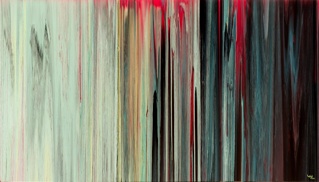
In the mind of a musician - Enamel on canvas - 140cm x 80cm.
KP: If you could have any three wishes, what would they be?
WN: On a professional level my wishes would be to have more live performances, to work on a score for a movie, and to give joy to people through my music.
KP: What’s up next for you?
WN: My challenge this year will be to finish recording my third album.
KP: I understand that you recently became a father. What is your little girl’s name, and how old is she?
WN: My baby girl, Katrina, was born on October 12th 2012. I am completely and madly in Love with her!!
KP: Beautiful! Is she showing an interest in music, or is it too soon to tell?
WN: She is definitely showing some interest. Soft piano music always helps her fall asleep.
KP: Does your wife play the piano, too?
WN: Not at all ;) She very much enjoys music but doesn’t play any instruments.
KP: Is there anything else you’d like to “talk” about?
WN: I speak four languages fluently (French, Arabic, English and Spanish), but it is through my music that I can communicate the best with people from all around the world. I’ve spent my life traveling and I am always amazed to witness that music (especially piano music) is an international language that can be understood by all human beings. In my opinion, the sound of the piano is probably the most universal of all instruments. Melodies through the piano are the most powerful form of expression. Piano music can unite people more than any other form of art, so let’s continue to teach, to play and to praise this magical instrument!
KP: Beautifully said, and I couldn’t agree more! Thanks for sharing that and for taking the time to talk about your life and music!
For more information about Walid Nahas, be sure to visit
his website and his
Artist Page here on MainlyPiano.com.
Kathy Parsons
January 2013

